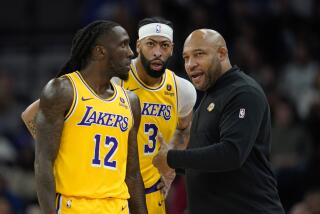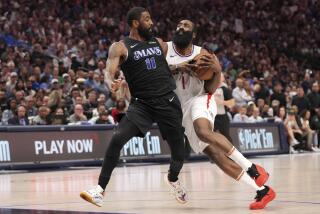Schultz Takes NCAA Reins From Byers : New Leader Says He’ll Do Plenty of Listening and Not Much Dictating
The National Collegiate Athletic Assn. is one of sport’s more venerable institutions. It has not been a fast-moving group. On the whole, the NCAA’s hallmark is one of sturdy, yet conservative, progress.
Thus, when college sports’ leading man steps down after 26 years, the thought is equally terrifying and exciting. On only his second day on the job, Dick Schultz is out to assure the college sports world that as the NCAA’s new executive director, he’s going to listen more than dictate.
On Thursday, Schultz, 59, officially succeeded Walter Byers, who had been executive director of the NCAA since the organization created the post in 1951. He will become director emeritus and concentrate on development of a foundation for the NCAA and college athletics.
Schultz, who signed a five-year contract with the NCAA in June, 1987, was the athletic director at Virginia since 1981 and before that was was athletic director at Cornell.
Schultz was in Ontario Friday to speak to a group of Division II and III athletic directors. Tonight, he will attend the USC-Oregon State game. It’s all part of Schultz’s school-a-weekend plan for introducing himself around the country.
College sports has gone down a rocky road of late, and public perception of collegiate sports heroes may be tinged with cynicism. Schultz’s message to athletic directors and college presidents is integrity and prosperity. Especially the integrity.
“I don’t view that as a major problem in the NCAA,” Schultz said. “But the public views it as a major problem, so I have to deal with it in a frontal attack. I don’t think you can legislate morality. We’ve been trying to do that for years. You have to get the members interested in it. There are real misconceptions about college athletics today. It follows what is happening in the world today. It’s hard to read and hear about positive things.”
Schultz spoke of society’s ‘broad brush’: When Southern Methodist University was ordered to suspend its football program--the NCAA death penalty--the public uses a broad brush to paint all of college teams as cheaters.
“Most of our student-athletes are bona fide role models,” Schultz said.
As for the residual problems Schultz will inherit, he appears to approach them with vigor and pragmatism.
“As far as drugs are concerned, we’re no different that what is happening in society,” he said. “We tested several thousand athletes at championship events last year, and only 2% total tested positive. Most of (the positive tests) were for anabolic steroids. I’d compare that to any segment of society.”
The NCAA operating budget is $79.4 million this year, with 81%, or $64 million, coming from the men’s basketball tournament.
Revenue from the the Final Four has been bankrolling the rest of the NCAA ever since the first television contract was signed.
Of the total budget, about $2 million is allotted for drug testing and education and $2 million for compliance.
Under Schultz, the NCAA will make a greater effort to catch the schools that cheat, and at less expense. It has long been a criticism of the governing body that it has staff and budget to investigate only a small portion of reported rules violations.
With this plan, the NCAA has set aside block grants totaling $3.1 million to the various conferences to police their own.
“I think we have tougher sanctions now with the death penalty, that’s been a real attention-getter,” Schultz said. “Without a doubt, we’ve seen a drop-off of reported violations. What we’d like to set up is a kind of early warning system, a compliance enforcement program.”
Under the program, the NCAA would set aside $90,000 a year over three years for the 30 Division I conferences, they would spend the money on investigating rules violations before the NCAA had to step in.
“They’ll find situations that aren’t violations yet but could be heading in that direction,” he said. “Of course, they will spend a lot of their time at first chasing down rumors.”
In the meantime, Schultz will be chasing off to see a football game. One in each college town.
More to Read
Get our high school sports newsletter
Prep Rally is devoted to the SoCal high school sports experience, bringing you scores, stories and a behind-the-scenes look at what makes prep sports so popular.
You may occasionally receive promotional content from the Los Angeles Times.







